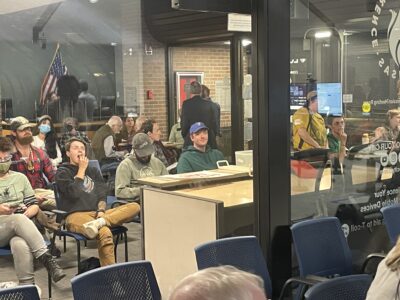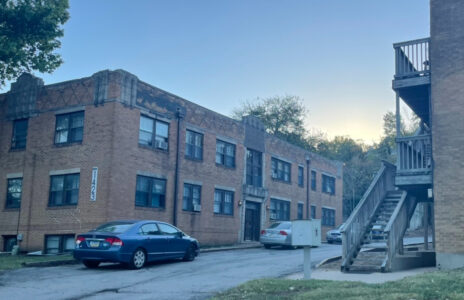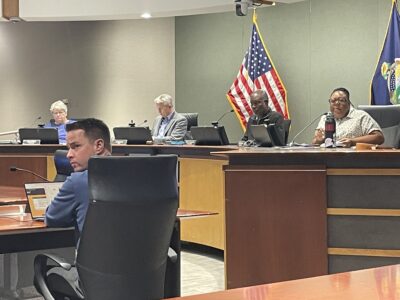Downtown bus station faces a speed bump with the World Cup, but Lawrence Transit’s ridership is holding steady, director says

photo by: Contributed/City of Lawrence
Felice Lavergne
Lawrence Transit’s biggest projects, like a downtown bus station and electrifying more of its fleet, are anticipating some minor speed bumps. But in terms of growth, its director says the ride has been fairly smooth.
Felice Lavergne, who took over as Lawrence Transit’s full-time director in May, told the Journal-World that the transit system’s ridership held relatively steady in 2024 after a spike in 2023, when the department stopped charging fares. In 2024, the transit system provided 2,497,862 total rides, up just slightly from the 2,462,886 it saw in 2023.
Lavergne said these numbers are close to the levels of ridership that the system had before the disruptions caused by the COVID-19 pandemic. To give an idea of how much the ridership “shot up,” in her words, that 2023 number was about half a million more rides than in 2022, when the system provided 1,936,415 rides.
“We’ve grown so much over the past few years, now is a great time for level setting,” Lavergne said.
A few months into her new job, the Journal-World spoke with Lavergne about what Lawrence Transit has been working on recently, including big projects like its bus station and electric vehicles and smaller improvements to reliability and safety:
Station timeline and charging capacity
Although Lavergne touted the progress made on ridership in the last few years, she also said there were some new complications with the construction of the new downtown bus station and the electrification of the transit fleet.
For the station project, Lavergne said it’s still going forward, but there has been a change to the timeline.
Late last year, the Lawrence City Commission selected a location for the bus station in a parking lot in the 700 block of Vermont Street, across from the Lawrence Public Library. Initially, construction on the project was expected to start in 2026, as the Journal-World reported. But Lavergne said that timeline was moved out because of the expectation of more visitors in Lawrence during the 2026 FIFA World Cup, in which Lawrence could be a base camp for a national soccer team.
Lavergne said the city did not want “to rip up (its) transit” during the World Cup activity, so while designs for the bus station may be presented in 2026, construction likely won’t happen until 2027.
There’s also a new wrinkle in the city’s efforts to continue growing its electric and hybrid vehicle stock, Lavergne said: The transit system is about to max out its charging capacity.
The department has nine electric or hybrid buses right now, and Lavergne expects two more to come within about 18 months, depending on the manufacturing process. Lavergne said 11 electric buses would make up about a quarter of Lawrence Transit’s total fleet, but that would also take up all of the currently available charging space at the city’s facility. One priority for the department will be adding more charging capacity so it can keep growing this part of the fleet.
Routes, safety and service
Aside from these big projects, there are many smaller adjustments that the system has made in recent years or will be working on soon, and Lavergne said these are important, too.
One thing the department has been monitoring is the public’s opinions on its routes. The bus route system underwent a major change in 2024, and Lavergne said the department was still collecting public feedback and refining the new routes. She said a new round of adjustments to the routes was scheduled to go into effect in August.
But Lawrence Transit isn’t just concerned with making the routes more efficient and reliable — it’s also concerned with safety and comfort, Lavergne said.
The department has noticed more people are “taking shorter and more frequent trips” recently, and Lavergne attributes this in part to the fact that the department has added more bus stop amenities like benches and shelters. And the department in recent years added a code of conduct, under which riders can be suspended or even outright banned from transit vehicles and facilities for offenses such as threats, fighting, sexual harassment or illegal drug use.
One question that Lavergne said it’s important to ask is “Would a middle schooler feel safe?” on the bus, because the department serves riders of all ages. She said the department has heard feedback from drivers and riders saying they do feel safer.
If the transit system wants to sustain and grow its ridership, Lavergne said it will also be important to get creative.
She pointed to programs like the department’s “poet laureate” program that rolled out in 2023, which invited writers to submit transit-related poems to be highlighted on social media and aboard Lawrence Transit’s electric buses. The department also has introduced a free travel training program, which helps people learn how to navigate the routes. And Lavergne also highlighted the role of Central Station at 2315 Bob Billings Parkway, where a boba tea shop recently opened as a new amenity for transit system riders.
Lavergne said all of these are part of the system’s efforts to be an asset to the community.
“We hope to keep providing the same level of service people have come to expect,” Lavergne said.







